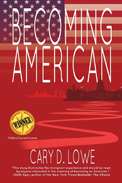
 |
Born at the American military hospital in Linz, Austria, in 1948, Lowe’s early childhood was spent in Braunau. His father was employed with the American government, and Lowe spent a lot of days surrounded by both local children and the children of American and international servicemen. Braunau was somewhat infamous as it was the birthplace and childhood home of Adolf Hitler. Nazi Germany shattered the lives and homes of many of Lowe’s Jewish relatives leading up to and during WWII. As a child and young man, Lowe was a constant witness to the destroyed cities and broken, despondent families trying to reconstruct lives after the war’s destruction.
Unlike many, Lowe felt his family was fortunate, considering his father’s work with the American government and the luxuries that it provided. In 1961, this position allowed his family to move to America and let Lowe be one step closer to becoming an American, a goal he set for himself at a young age. He completed that goal at the age of seventeen, which also allowed him to join the Navy ROTC program for college. During his time, he did well in the program but was also becoming increasingly aware of the racial and social discrepancies he saw all around him. In addition, he began seeing the war in Vietnam as a mistake. A knee injury allowed him to be medically discharged from the Navy at a point where he was disillusioned with the military. He would go on to become a political activist, urban planner, and lawyer, among other things. Lowe’s career would involve him in several major local and statewide policy meetings and changes. Some of the highlights included taking on major savings and loan issues and unfair housing treatment.
Half of this memoir covers Lowe’s childhood in Europe and then his Americanization during his adolescent and adult years. There is a portion dedicated to returning to Europe and attempting to reconnect with the family there and the life he lived as a boy. The rest is about his political activism and work as a lawyer. The early portion is reminiscent of Tobias Wolff’s book This Boy’s Life: A Memoir. Both boys share their good and bad virtues, including the poor choices they made, which would eventually help them to become better men. In a similar sense, Lowe’s journey once he reached America slightly parallels Frank McCourt’s journey in his memoir ‘Tis. Both men serve in the American military, get a college education, and see the inequalities in American life.
Lowe’s lifetime of writing reports for committees, courtroom docs, and editorials has given him a professional command of language and grammar. However, unlike the overly technical or obscure language often found in those documents, his writing is easy to read and conversational. He excels while writing about his childhood and his return to Europe through his ability to convey universal experiences. A couple of examples include when he talks about a tense exchange between his father and Russian soldiers when they had a flat tire and when he relays the story of an American fighter crashing near his location during the Cold War. The personal and universal moments he shares are appealing and surpass all other portions of the book. Many readers will likely stay engaged and enjoy this autobiography.
A 2024 Eric Hoffer Book Award Memoir Honorable Mention